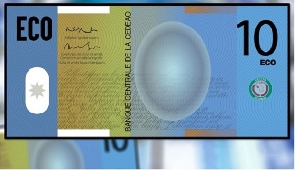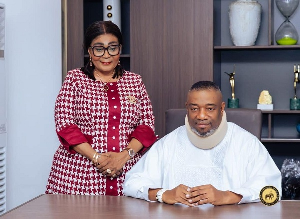Dr Dossina Yeo, a Financial Economist from the Ivory Coast has stated that a single African currency will promote economic integration, facilitate trade and investment, and create a more stable and prosperous Africa.
“African will constitute the larger market for goods and services and will attract investors and stimulating economic growth and lead to economies of scale and enhanced competitiveness, benefiting both businesses and consumers."
Dr Yeo stated this during the seventh Ghana International Trade and Finance Conference (GITFiC) held at Senchi in the Eastern Region and attracted patrons from over 10 African countries and beyond.
The conference which dwelt on building a single currency for the sub-region also made strides in the intra-African trade to reduce import bills for member countries.
Dr Yeo said the single currency would also increase the development of regional value chains and make countries to focus on producing goods and services in which they had comparative advantage, leading to increased productivity and higher-quality output.
He mentioned some of the challenges of the single currency as lack of continuous leadership and commitments and acceptance of countries to abandon parts of their sovereignty, different economic structures, characterized by variations in income levels, production capabilities, and resource endowments and high inflation rates, volatile exchange rates, and fiscal imbalances which could undermine the credibility and effectiveness of a common currency.
He suggested to countries to address the stability issues through sound fiscal and monetary policies, sustainable debt management, and structural reforms.
“I want to commend Mr. Selasi Koffi ACKOM, Chief Executive Officer of Ghana International Trade & Finance Conference for inviting me to this important conference, being held on the theme: Sovereign Economic Vulnerabilities: An Endorsement for a Single Trading Currency: The African Union Perspective."
Dr Yeo said Economic integration had been at the heart of Africa’s integration agenda since the 1990s, where African leaders adopted the Abuja Treaty, officially known as the Treaty Establishing the African Economic Community, which represented a significant landmark in the pursuit of the promotion of regional cooperation, economic development, and unity among African nations.
He said it provided for the creation of an African Economic Community through a six-phase process of co-ordination, harmonization and progressive economic integration of the continent using the Regional Economic Communities in Africa as its building blocks.
“The Treaty was planned to be realized over a period of 34 years starting from its entry into force in 1994 and completed in 2028.
“The final stage involves; among others, the integration of all the sectors namely economic, political, social, and cultural and the setting up of a Pan- African Monetary and Economic Union supported by the establishment of an African Central Bank (ACB) with a single African currency.
“The adoption of the African Continental Free Trade Area (AfCFTA) in 2018 constituted the third stage of the Abuja Treaty. The fourth and Fifth stages being the establishment of an African Common Market, Free movement of persons and the Provisions regarding the rights of residence expected in 2019 and the establishment of the Continental Customs Union by 2022 respectively.
He said the African Union Commission was also working with the Association of African Central Banks for the establishment of the African Monetary Institute prior to the creation of the African Central Bank, which President Nana Addo Dankwa Akufo-Addo, of Ghana was appointed in 2019 to provide leadership, advocacy and mobilizing his Peers to fasttrack the establishment of all four AU Financial Institutions.
“At the regional level, many Regional Economic Communities (RECs) are struggling to implement trade integration such as the free trade zones and a common external tariff, among others. Only ECOWAS, COMESA and EAC are performing well. ECOWAS and EAC stand out from other RECs regarding free movement of people which can be explained by the difficulties experienced in either implementing regional free movement protocols or the abolition of visas in the respective Member States”.
He said in terms of monetary integration, all the RECs were also struggling.
“ECOWAS, SADC and EAC are making progress towards monetary integration, with the establishment of preparatory institutions for monetary integration, such as a Monetary Institute and a committee for the harmonization of convergence criteria.
“We all know the benefits of the establishment of a common currency as the continent is facing fragmentation of currencies and monetary systems which is preventing Africa to realise its full potentials.
Dr Yeo said the private sector could drive the economic integration among African countries by promoting cross-border trade, investment, and financial flows. Under AfCFTA, businesses could expand their operations across borders, leading to increased economic interdependence and convergence.
“Chambers of commerce, business associations, and industry groups, can actively advocate the establishment of a monetary union as their involvement will enhance the dialogue between policymakers and the private sector, ensuring that the interests and concerns of businesses are considered in the decision-making process.
“The private sector can facilitate trade, which are crucial for the smooth functioning of a monetary union. By implementing efficient logistics, customs procedures, and trade facilitation measures, businesses can reduce transaction costs, enhance competitiveness, and promote seamless cross-border trade.
Dr Yeo said “the establishment of a monetary union in Africa is not merely an economic endeavor; it is a transformative step towards achieving the “Africa We Want”, a United and Prosperous Continent.
“It is a testament to our shared vision, collective aspirations, and determination to build a better future for our people. It is an opportunity to transcend borders, bridge divisions, and unlock the vast potential that lies within Africa.”
Business News of Wednesday, 7 June 2023
Source: GNA













